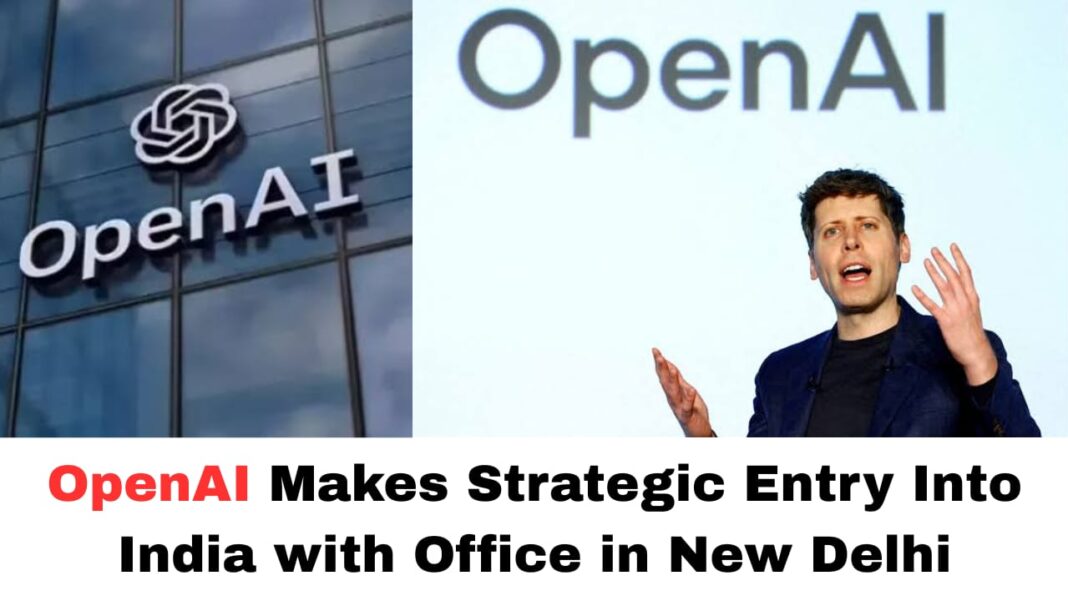Digital News Guru New Delhi Desk:
In a landmark move that deepens its global presence, OpenAI—the creator of ChatGPT and backed by Microsoft—is preparing to open its first corporate office in India, based in New Delhi, before the end of 2025. This expansion marks a significant milestone in the company’s commitment to one of its fastest-growing markets.
A Surge in User Engagement Sparks Expansion
India has emerged as a high-growth frontier for ChatGPT, now ranking as its second-largest user market worldwide. In only the past year, weekly active users in India have quadrupled, signaling immense demand and deepening user engagement.
The platform’s most robust demographic in the country? Students—India accounts for the largest population of student users on ChatGPT, affirming the product’s resonance in educational spaces.

Building Local Presence: Hiring and Partnerships
OpenAI has already registered as a legal entity in India and initiated local hiring efforts, going beyond its sole India-based employee, Pragya Misra, who heads public policy and partnerships.
Job openings for senior sales roles with over seven years of experience are already posted, signaling a growing local team to be based in New Delhi. Additionally, OpenAI has engaged former Truecaller and Meta executive Pragya Misra, as well as Rishi Jaitly, previously Twitter India head, to lead dialogues with the Indian government on AI policy.
Lower-Cost Access and Tailored Offerings
To deepen market penetration, OpenAI recently introduced ChatGPT Go in India, priced at approximately Rs 399 (~$4.60) per month—making it its most affordable plan globally. This pricing strategy—alongside existing free and premium offerings—demonstrates a clear push to balance accessibility with affordability in the Indian context.
Aligning with IndiaAI Mission and Education Initiatives
OpenAI’s expansion dovetails with India’s IndiaAI Mission, a Rs 990 crore (USD 1.2 billion) government initiative to build tailored AI infrastructure, models, and training ecosystems.
Further solidifying its local commitment, OpenAI has pledged support for the mission by collaborating on the OpenAI Academy. This initiative aims to provide educational materials in Hindi, English, and other regional languages. It also includes API credits for 50 startups or fellows and training for over a million teachers on GenAI usage.
Upcoming India-Focused Events
In a show of further engagement, OpenAI plans to host two flagship events in India this year: an Education Summit followed by a Developer Day—designed to forge deeper connections with students, educators, startups, and enterprises.

Facing Challenges: Competition and Copyright Concerns
Despite these exciting developments, OpenAI must navigate headwinds. It faces stiff competition in India from Google’s Gemini and Perplexity, both offering strong preferences to users through free or localized service plans.
Legal challenges also loom—several Indian news outlets and publishers, including ANI, have accused OpenAI of using their content without authorization to train its models. The firm denies these claims, but the case spotlights broader questions about AI training ethics and copyright in India.
Why India Matters to OpenAI’s Global Strategy
OpenAI CEO Sam Altman emphasizes that the New Delhi office and local team represent a vital step toward making “advanced AI more accessible across the country” and building AI for India, and with India—a uniquely localized approach.
He pointed to India’s tech talent, vibrant developer ecosystem, and the government’s commitments through IndiaAI as evidence that the country is primed to become a global AI leader.
What This Means for India and the Future of AI
This move has the potential to reshape the Indian AI landscape:
- Expanded Collaboration: OpenAI will be better positioned to partner with Indian stakeholders—from government bodies to academia—to co-create Indian-focused AI tools and policy frameworks.
- Education and Democratization: Local events and academy programs could boost GenAI literacy and access, particularly among underserved communities and educational institutions.
- Economic Opportunities: The office is likely to catalyze employment, startup engagement, and technological innovation via OpenAI’s API support and localized tooling.

- Ethics and Regulation: As policymakers ramp up AI governance, OpenAI’s physical presence positions it to actively shape India’s AI regulatory environment.
In Summary
OpenAI’s move to establish its first office in New Delhi by the end of 2025 underscores the strategic importance of India in its global growth ambitions. With a rapidly expanding user base, deep educational penetration, and strong governmental alignment through the IndiaAI Mission, OpenAI is poised to deepen its roots in the country.
Still, it must contend with mounting legal scrutiny and fierce local competition. How well it navigates these challenges will determine whether this expansion becomes a blueprint for the future of AI in India—or a cautionary tale in the complexities of global AI localization.
You May Also Read: Nagaland Governor La Ganesan died in Chennai at the age of 80








